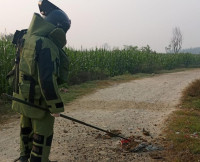National
MCC aid flow has stopped as government is still on the fence regarding the programme’s House ratification
With Parliament currently prorogued and no certainty as to when it will convene, there are concerns over early implementation of the projects under the American programme.
Prithvi Man Shrestha
Nepal received only five percent of the fund pledged by the United States under its Millennium Challenge Corporation Nepal Compact last fiscal year, as Parliament could not ratify the programme amid opposition from some sections within the ruling Nepal Communist Party.
The MCC was supposed to disburse Rs6 billion in the last fiscal year, but only Rs300 million was disbursed as the US agency stopped releasing resources from its part since October last year, according to the Millenium Challenge Account Nepal, a Nepal government agency that manages the MCC Nepal Compact.
The $500 million MCC Compact is a large five-year grant programme under which the fund is provided to the countries that pass the MCC’s eligibility criteria including democracy and transparency.
Nepal signed up to the MCC Compact in September 2017.
As per the MCC Compact agreement between the MCC and the Nepal government, the Compact will remain in force for five years after its entry into force until it is terminated.
The KP Sharma Oli government had promised to get the Compact endorsed by Parliament in September.
The Compact’s parliamentary ratification, however, has become a politically divisive issue, as a section of ruling Nepal Communist Party leaders claims that the programme is part of the US-led Indo-Pacific Strategy aimed at ‘containing China’.
Some leaders have also argued that the MCC compact will prevail over existing Nepali laws, a claim denied by the US officials.
If things had moved as planned, the Compact should have got House ratification before June 30.
With the Parliament remaining prorogued at present and with no certainty when it will convene, the US programme’s House ratification continues to hang in the balance.
“The aid flow has stopped since October last year. Rs300 million was released before the MCC stopped disbursing resources,” said Pushpa Adhikary, chief financial officer at the Millennium Challenge Account Nepal (MCA-Nepal).
Even though a dispute in the ruling party was at its peak, the government had included projects under the MCC–development of two 400KV transmission lines and the improvement of the East-West Highway–in its annual policies and programmes.
The projects were later put on hold by the governing party after criticism from those opposing the MCC.
Officials at the MCA-Nepal say the United States has stopped releasing funds “to press” Nepal to act quickly to ratify the MCC Compact.
With the US discontinuing the fund, the government in November last year had decided to continue preparatory works to implement the Compact with its own resources by confining its expenditure within the limit that the government is supposed to spend.
Tulasi Sitaula, a former government secretary, said that the government should have ensured that the US continues to fund the preparatory works as per the agreement.
“The US side cannot escape its commitment even if there’s a delay in parliamentary ratification of the programme,” said Sitaula, who was one of the early negotiators from Nepal for the MCC Compact.
Of the total $630 million fund to be spent under the compact, the MCC would provide $500 million, while the Nepal government would put a counterpart fund of $130 million.
“Most of the funds spent in the last fiscal year through the MCA-Nepal is from the government resources,” said Adhikary of MCA-Nepal. “Of the total expenditure of Rs1.24 billion in the last fiscal, the government disbursed Rs940 million while the MCC spent just Rs 300 million.”
The expenditure made so far is only for preparatory works.
“Only after the agreement enters into force, will the actual construction works begin,” said Khadga Bahadur Bisht, executive director of the MCA-Nepal.
Overall expenditure to implement the MCC Compact was poor last fiscal year.
According to the Finance Ministry, only 14.25 percent of the total allocated budget was spent in the last fiscal year 2019-20.
In the revised allocation, the overall budget under the MCC Compact in the last fiscal year was Rs8.7 billion from the initial allocation of Rs10 billion. But expenditure stood at just Rs1.24 billion with recurrent expenditure at Rs416.5 million and capital expenditure amounting to Rs824.8 million, according to the ministry.
Due to poor expenditure, the MCA-Nepal had returned Rs1.65 billion to the Finance Ministry.
“One of the reasons why the overall expenditure remained poor is the Covid-19 pandemic as well,” said Adhikary.
The MCA-Nepal had planned to distribute compensation for land acquisition starting from March or April, but as the pandemic ravaged the world including Nepal, it failed to execute its plan.
Nepal government had allocated Rs3.97 billion for land acquisition. “We could not distribute the compensation due to the Covid-19 lockdown,” said Adhikary.
All the resources to be distributed for land acquisition were supposed to be released from the government’s account.
Expenditure on electricity infrastructure including for detailed design also remained poor. The government had allocated Rs3.32 billion for the purpose.
The MCC was supposed to disburse the entire amount in the last fiscal year.
Expenditure under the heading, however, stood at just Rs650 million, according to the MCA-Nepal.
Although the MCC was supposed to disburse all the amount, it is the government that disbursed most of the resources for expenditure.
According to the MCA-Nepal, the government disbursed Rs525 million while the MCC spent Rs125 million under electricity infrastructure heading.
The government had allocated Rs1 billion for the improvement of road sections of the East-West Highway. But only Rs4.1 million was spent from the government’s resources.
The government had spent most of the amount for the consultancy services.
A budget of Rs1.6 billion was allocated for consultancy services—all to be paid by the MCC last fiscal year.
The overall expenditure under the heading stood at Rs350 million for the purpose, according to the MCA-Nepal.
Of the total expenditure on consultancy services, Rs270 million was disbursed by the government and the MCC disbursed Rs80 million.
With the parliamentary ratification pending, question is now looming if the country will ever receive a single penny under the MCC in coming days.
“Nepal took so long to start implementing the Compact compared to many other countries,” said Sitaula. “The US, however, has been patient, which shows that the US is committed to providing this grant to Nepal.”
The United States in June-end said that funding under the compact is not open-ended and urged the government and the political parties to take “tangible, near-term steps” to ensure its viability.
“Ratification is the next step needed to proceed with the $500m grant, which the two countries signed in September 2017 and which Nepal committed to ratify by September 2019,” the US Embassy in Nepal said in a statement on June 29. “Delaying the ratification is delaying the benefits of more jobs and increased economic growth for nearly 23 million Nepalis.”
After the Nepal government failed to ratify the agreement, the Finance Ministry has requested for a deadline extension for the ratification.
In an interview with the state-owned Rastriya Samachar Samiti last month, Finance Minister Yubaraj Khatiwada said that the government has received positive response from the MCC headquarters.
“The MCC does not release the fund unless it is approved by Parliament and the parliament session ended recently due to Covid-19,” Khatiwada told the news agency. “The Ministry of Finance has urged the MCC to extend its ratification term and has received a positive response.”
As the conflict within the ruling Nepal Communist Party (NCP) continues, there’s no certainty when Parliament will be convened.
“I think the US will wait at least until the next parliamentary session,” said Sitauala, “whether to continue the MCC project in Nepal or withdraw.




 24.89°C Kathmandu
24.89°C Kathmandu















